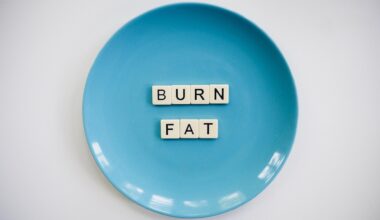Post-Workout Nutrition Hacks for Nighttime Athletes
For athletes who engage in evening workouts, proper post-workout nutrition is critical to optimize performance and recovery. The body requires specific nutrients to repair muscles, replenish glycogen stores, and enhance overall recovery. Timing and the quality of food choices play essential roles in this process. A balanced meal should ideally be consumed within 30 minutes to an hour after finishing your workout. Nutritionists recommend including lean proteins, healthy fats, complex carbohydrates, and electrolytes in these meals. Protein sources, such as chicken, fish, tofu, and legumes, help in muscle recovery. Incorporating whole grains like brown rice or quinoa replenishes glycogen levels, while healthy fats from foods such as avocados or nuts can reduce inflammation. Hydration is equally important before and after workouts, so include water or electrolyte-rich beverages. Furthermore, consider adding antioxidants through fruits like berries to combat oxidative stress. Overall, a nutrient-dense meal plan is essential for promoting quality sleep after nighttime athletic pursuits, ensuring optimal recovery and preparation for the next day’s activities. Ignoring this aspect may lead to fatigue, decreased performance, and hindered long-term fitness goals.
To effectively enhance post-workout nutrition, focusing on macronutrient ratios is highly beneficial. The balance of proteins, carbohydrates, and fats varies according to individual training intensity, body weight, and specific goals. A general guideline for athletes is to consume 1.2 to 1.5 grams of carbohydrates per kilogram of body weight and around 0.25 to 0.3 grams of protein. This combination accelerates glycogen replenishment and facilitates muscle repair. Including additional micronutrients like vitamins, minerals, and antioxidants can further improve recovery efficiency. Foods rich in magnesium, such as leafy greens and nuts, support muscle relaxation and recovery. Iron, found in red meats and legumes, plays a pivotal role in energy production. Additionally, zinc and vitamin D contribute to immune health, allowing athletes to maintain peak performance without interruptions. It’s crucial to personalize post-workout meals according to individual dietary needs and preferences. This personalization promotes not only recovery but also satisfactory sleep quality post-exercise. Thoroughly monitoring and adjusting your macronutrient intake will lead to noticeable improvements in performance and overall health over time. Incorporating a variety of foods ensures a well-rounded, satisfying post-workout meal experience.
Sleep and Post-Workout Nutrition Connection
A well-balanced post-workout meal significantly impacts sleep quality for nighttime athletes. Following a structured diet adds substantial benefits to rest, enabling the body to repair and rejuvenate overnight. Specific nutrients also play crucial roles in promoting sleep-inducing hormones like melatonin and serotonin. Complex carbohydrates in whole grains, when paired with protein sources, can help regulate these hormone levels. Additionally, certain amino acids found in protein help the body produce the neurotransmitter serotonin, leading to improved mood and relaxation. Consuming magnesium-rich foods aids in muscle relaxation as well, making it easier for athletes to fall asleep. It’s essential to avoid heavy, greasy meals that may disrupt sleep, as these can impede digestion and lead to discomfort. Instead, opt for light and nourishing options that support a smooth transition into sleep. Consistency in post-workout nutrition schedules alongside adequate sleep routines can enhance mental clarity and focus. This results in improved performance during subsequent workouts, creating a positive feedback loop. Therefore, consciously structuring post-workout nutrition to support both recovery and sleep cannot be overstated for optimal athletic success.
Another vital aspect is the timing of meals post-exercise. Consuming a well-timed snack or meal can directly influence the recovery process. Immediate post-workout snacks such as protein shakes, banana smoothies, or Greek yogurt with fruits can be effective choices. These help kickstart recovery by providing quickly digestible nutrients and hydration. Within 30 minutes after exercising, the body’s glycogen stores are at their most receptive, emphasizing the importance of this time frame. Following the initial snack, a balanced meal should be consumed within two hours, focusing on the combination of carbs and protein mentioned earlier. For athletes engaged in longer or more intense training, the post-workout nutrition becomes even more crucial. These individuals should consider increasing the portion sizes of their meals, as higher energy expenditure leads to the necessity of adequate replenishing. Combining nutrient-dense foods and maintaining appropriate portion sizes can ensure that the body receives all necessary components for comprehensive recovery. Prioritizing post-workout nutrition ultimately sets the stage for a restful night’s sleep, which is indispensable for peak athletic performance in future workouts.
Hydration’s Role in Recovery and Sleep
Hydration is a fundamental element affecting both recovery and sleep quality post-exercise. Athletes often overlook the importance of fluid intake surrounding their workout sessions. After exercising, the body can lose essential electrolytes through sweat, which can lead to dehydration. Incorporating beverages rich in electrolytes or simply water immediately after a workout is necessary to replenish lost fluids. This can enhance recovery by ensuring metabolic processes function correctly. A well-hydrated body also helps regulate body temperature and supports joint lubrication, reducing potential discomfort. To promote better sleep, maintain hydration throughout the day, leading up to the workout. However, be cautious with fluid intake right before bedtime; overloading on liquids close to sleep can lead to nighttime disruptions. Instead, set a hydration schedule to ensure effective recovery while avoiding sleep interruptions. Infusing water with fruits or herbs can offer a tasty twist while encouraging adequate fluid intake. Monitoring fluid consumption and making necessary adjustments according to the intensity of workouts can significantly enhance performance and sleep quality. A well-hydrated athlete cultivates both short-term recovery and long-term health benefits, creating a balanced lifestyle.
Meal prepping for nighttime athletes can add structure to post-workout nutrition, fostering consistency and convenience. Planning meals ahead helps eliminate guesswork after a tiring workout, allowing for quick access to nutritious foods. Batch cooking protein sources like chicken, fish, or lentils and incorporating frozen vegetables can ensure easy assembly of meals. Preparing overnight oats with yogurt and fruits can be an excellent pre-prepared option for quick nutrition. This practice significantly reduces the temptation to indulge in unhealthy options when fatigue sets in. By creating healthy snacks, such as energy balls or nut mixes, athletes can satisfy their cravings without compromising their goals. Meal prepping shouldn’t just focus on the main dinner; beverages and snacks are just as important. Keeping a selection of electrolyte drinks or fruit-infused waters readily accessible can provide better choices during recovery. Meal preparation encourages better nutritional habits, strengthens recovery, and aids in quality sleep by reducing stress and uncertainty surrounding food choices. As such, integrating meal prep into a routine can prove beneficial to nighttime athletes striving for peak performance.
Supplementation for Enhanced Recovery
For athletes looking to optimize post-workout recovery, specific supplements can provide substantial benefits. Supplements such as branched-chain amino acids (BCAAs), creatine, or whey protein can expedite recovery and enhance muscle repair. BCAAs help reduce muscle soreness and increase muscle strength, particularly when taken shortly after a workout. Creatine supplementation can support increased strength during workouts, while also aiding recovery. Whey protein acts as a convenient source of protein that’s quickly absorbed by the body, making it an ideal choice post-exercise. Omega-3 fatty acids, found in fish oil, can reduce inflammation and promote muscle recovery as well. Additionally, magnesium and zinc supplements may support better sleep and recovery. However, it’s crucial for athletes to consult with a healthcare or nutrition professional before adding any supplements to their regimen. This precaution ensures that they are selecting the right types and dosages to meet their personal needs. Ultimately, supplementation in conjunction with a well-rounded diet can enhance recovery, improve sleep quality, and maximize athletic performance. Taking these insights into account can help athletes effectively navigate their post-workout nutrition strategy.
Lastly, keeping a consistent sleeping schedule is essential when considering post-workout nutrition and sleep quality. Sleep routines can significantly affect recovery and overall performance. Athletes should aim to go to bed and wake up at the same times every day, including weekends. Establishing these habits can regulate the body’s internal clock, leading to improved sleep quality. Combining post-workout nutrition with a structured sleep schedule can establish a holistic approach to recovery. Creating a conducive sleeping environment by minimizing distractions helps further enhance sleep. Dark, quiet spaces promote better rest and are conducive to recovery. Athletes can consider relaxation techniques before bedtime, such as light stretching or mindfulness practices. These methods can assist in winding down after a training session, allowing the body to transition into sleep more easily. By reinforcing the importance of both nutrition and sleep, athletes can recover optimally and improve performance over time. Emphasizing a comprehensive recovery plan through post-workout nutrition, hydration, and sleep hygiene ensures greater success in their fitness journey. This integrative approach empowers athletes to reach their goals, leading to a healthier, more fulfilling lifestyle.


